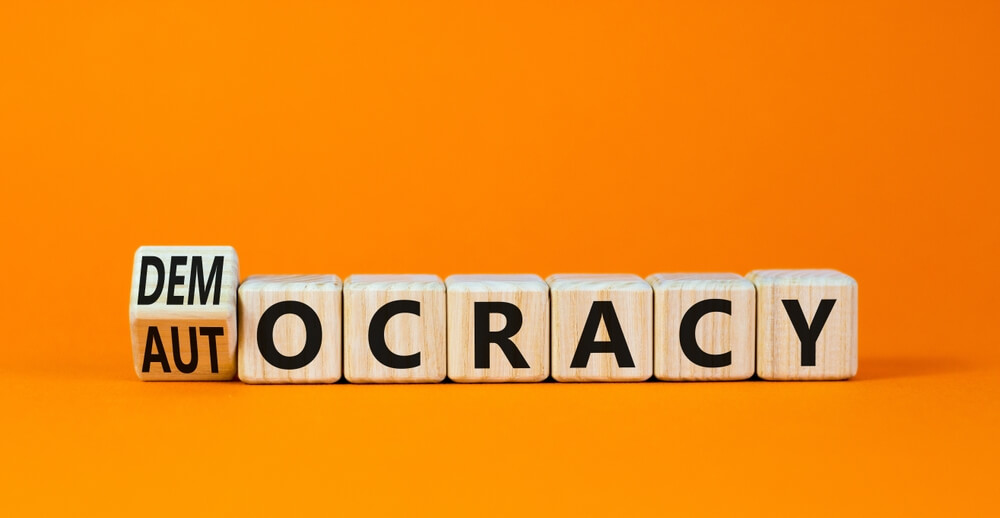One of the premier organizations that tracks the progress or backsliding of freedom around the world recently issued its annual assessment – and it documented plenty to be concerned about.
“Global freedom declined for the 18th consecutive year in 2023,” Washington, D.C.-based Freedom House found. “The breadth and depth of the deterioration were extensive. Political rights and civil liberties were diminished in 52 countries, while only 21 countries made improvements.”
Full disclosure, I am proud to say that my wife works for Freedom House.
The assessment echoes the findings of another recent global report card, the V-Dem Institute at the University of Gothenburg. It recently noted that while the world now is pretty much evenly divided between democracies and autocracies, “71% of the world’s population – 5.7 billion people – live in autocracies – an increase from 48% ten years ago.”
A catalyst for the rise or fall of democracy
Of course, no two nations are alike, and there may by myriad reasons for any given country tipping into autocracy, including armed conflict, religious extremism or economic conditions that bad actors leverage for their own gain.
But one commonality emerges across cultures and continents. The simple act of holding an election provides a choice—and that choice can be critical. Elected leaders can be a catalyst for adhering to the laws and structures that protect democracy, or they can be a catalyst for eroding and tearing down those safeguards—and accelerating a country towards autocracy.
More than half the world’s population will head to the polls this year in one of the most consequential periods for pluralism, the peaceful coexistence of diverse ideas, ethnicities, religions in the same political system and a powerful antidote against autocratic tendencies.
The good news amid these worrying reports is that the forces of democracy can still rally those corners of the world where pluralism is on the ropes. As Freedom House puts it, “by drawing strength from diversity, protecting dissent and building international coalitions to support their own norms and values, democratic forces can still reverse the long decline in global freedom.”
That achievement must be underpinned by effective K-12 education. While pluralism is a prerequisite to a functioning democracy, education provides the foundation for pluralism. Without it, you can’t have a democracy, with a populace prepared for the challenges and the critical thinking required to make the right decisions.
The safeguard of democracy is education
At a time during the last century when autocracies were on the march, Franklin Roosevelt was spot on when he said that “democracy cannot succeed unless those who express their choices are prepared to choose wisely. The real safeguard of our democracy, therefore, is education.”
For the U.S., with its own national election this year, much has been written about the state of K-12 education and its challenges in the wake of COVID. Math and English scores are down, absenteeism is up, disparities among various demographic groups have become more pronounced. At the same time, only 22% of eighth graders tested on the 2022 NAEP assessment were proficient or advanced in civics.
For anyone concerned about the long-term viability of our democracy and pluralism, this should give pause.
“One big idea that we educators have ignored for too long is the relationship between education and our democracy,” says Bill Conrad, a K-12 educator for more than 45 years. “Our democracy and its K-12 education system are in the emergency room with a life-threatening disease.”
To combat this ailment, the U.S. is on the right path with a major a national push to fix K-12 education and spread literacy and numeracy far and wide, to all American kids, wherever they live and whatever their backgrounds. There also is an increasing and encouraging focus on civics education. One area that still requires more focus nationally is ensuring children have the critical thinking skills in place as artificial intelligence takes root and challenges their ability to discern truth from fiction, though some states like California are making bold steps forward.
“This year, voters around world will be asked to embrace democracy despite the countervailing forces of division and exclusion. The results of these elections will shape the international environment for years to come,” says Freedom House.
Today’s K-12 student will soon be in a position to cast a vote in an election that could be just as consequential. We must better prepare our children to make the right calls.







